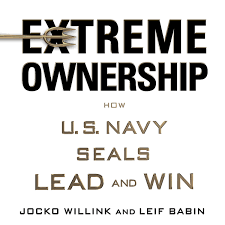 One Sunday morning not too long ago, my pastor made reference during his sermon to Extreme Ownership: How U.S. Navy SEALs Lead and Win. I knew I had to check it out. The title alone causes a guy like me to want to take a second look. Between Amazon and my Kindle, I was reading it within minutes.
One Sunday morning not too long ago, my pastor made reference during his sermon to Extreme Ownership: How U.S. Navy SEALs Lead and Win. I knew I had to check it out. The title alone causes a guy like me to want to take a second look. Between Amazon and my Kindle, I was reading it within minutes.
The principle of Extreme Ownership is quite simple. The authors, two former Navy SEALs, suggest that a leader must own everything in his or her world. They analyze real-life scenarios from the battlefield, a place you and I will likely never go, and apply the lessons learned there to the workplace.
What applications of extreme ownership can be made in the nonprofit world? First, some complaints I’ve heard:
- Donations are down. We won’t make budget this year.
- We don’t have enough volunteers to serve our constituents.
- Nobody knows what we do.
- We don’t know any people with lots of money.
- Our board doesn’t do anything.
In any situation, whether it’s a budget issue or an un-engaged board, the leader who exhibits Extreme Ownership must own that situation. Rather than laying the blame on someone else or on outside factors, or acting like a victim to circumstances, the leader must ask “What could/should/will I do differently next time in order to own a better result?“
When I began reading the book, I immediately noticed how this principle applies directly to every organization I serve and every leader I work alongside. I’ve had the pleasure of recommending it to several of those leaders and have seen the difference the principle of Extreme Ownership can make.
I definitely recommend this book without any hesitation. I hope you enjoy it as much as I did!
Your friend,
Kent Stroman,
America’s ASKing Coach
PS: I’d love to hear what you think of this book. When you finish, let me know how you can apply Extreme Ownership to your job!





 [caldera_form id="CF591c6f3f5221c"]
[caldera_form id="CF591c6f3f5221c"]
